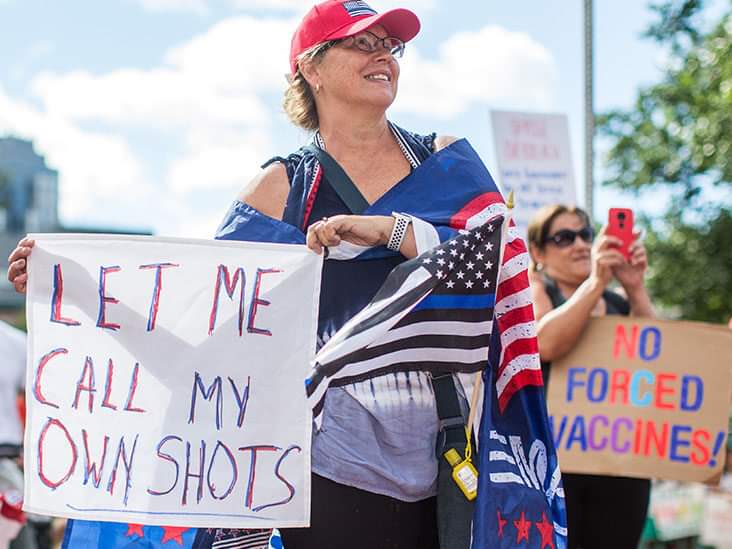

Dominik Lenarcic
Prose & Poetry Editor
A few months ago, Abigail Thorn of Philosophy Tube posted an interesting video titled “Vaccines & Freedom”. Its purpose was to open a philosophical discussion about vaccine hesitancy in the age of COVID-19, facilitated by analysing the results of a UK-wide research project (of which Abigail was a part of) including conversations with UK citizens, who for one reason or another, reject the COVID vaccine. Rather than to condemn them, the project was undertaken in the hopes of genuinely understanding these individuals and their positions. As Abigail points out, little effort is put in understanding and talking to voluntarily unvaccinated individuals. We degrade them, we talk about them (but not TO them) in a moralising manner, we call them selfish and uneducated antivaxxers, who should just swallow their pride and work for the greater good. But are they really “selfish” and “uneducated” or are there real moral and ethical dilemmas that need to be addressed?
The video and the report (both cited below) divide the causes for vaccine hesitancy/scepticism into three aspects: costs vs. benefits of the vaccine, mistrust and the question of rights and liberty. Those who oppose the COVID vaccine on the grounds of safety and risks of vaccination frequently point to the relative haste with which the vaccine was developed, and the real health risks involved with vaccination. There are also people who call (the antibodies in) vaccines unnatural and who question the need for them (in the sense that we all already have an immune system). The “unnatural argument” can be easily disproven with a crash course on how vaccines and antibodies work. As for the other two, Abigail breaks them down thusly: Firstly, we got the vaccine so fast because we already have the technology and science (after all, this isn’t humanity’s first viral outbreak) and since this is an urgent global issue, funding for it was immediate and guaranteed. As for the question of possible long-term side-effects, Abigail admits we don’t yet have a lot of evidence regarding these effects but as she continues, getting vaccinated is ultimately safer than catching and surviving the disease, since the latter has a much higher possibility of death (may I also add that so far, the side-effects of COVID have proven to be worse than those of vaccination).
That does, however, require a certain level of trust in vaccines and those who promote them. Trust, something that many voluntarily unvaccinated individuals don’t have (anymore). This leads us to the next aspect: mistrust aimed towards the government, institutions, and individuals. In the case of the government, this mistrust is rooted in what the respondents identified as displays of incompetence and corruption, as in the case of Boris Johnson and those infamous parties at Downing Street (if they don’t follow the rules, why on Earth should we?). They also consider pharmaceutical corporations and the scientists that work for them, as well as corporate media, to be inherently untrustworthy – they mentioned seeking information in alternative sources of information and “doing their own research” (take a wild guess what they meant by that). While their mistrust is partly justified, especially given the past actions of certain governments and corporations, the respondents clearly step over the line from genuine scepticism into the camp of conspiracy theories and people who scream “JET FUEL CAN’T MELT STEEL BEAMS!”. Not exactly the best image for those, who want to be taken seriously.
The third and last aspect is the question of rights and liberty. The respondents see their decision on a political level, as in they see the pressure for vaccination as authoritarian, and on a personal level, as in they reject said pressure to uphold their independence from the government and other people – when it comes to making decisions, they advocate free choice, in a similar manner to “my body, my choice”. Additionally, they chide those who got vaccinated without question, they call them naïve and foolish for blindly going along with the measures like sheep. Since their views aren’t exactly seen in a good light, many voluntarily unvaccinated individuals find themselves feeling isolated and marginalised – in one case, a carer was called inconsiderate for not getting vaccinated, even though she claims she cares for her patients. They consider themselves oppressed, they appropriate the language of oppressed groups of people, even though many of them are white (well-off) Christians and therefore not actually oppressed. The “sheep argument” is also infuriating when you consider how uncritical these sceptics really are. If you wanted to be blunt, you could call them sheep with a different, less upstanding shepherd. And lastly, there is the problem of free choice in health. By not getting vaccinated, they endanger those around them, but because they will never see them suffer, they never consider the consequences of their actions. Not getting vaccinated is a little bit like smoking because you’re not isolating harm to yourself and your body, you’re hurting other people too. You’re blowing into my face, and I would very much prefer not to get lung cancer (or COVID for that matter).
Both sources emphasise, that voluntarily unvaccinated individuals need to be approached in a way that involves empathy, not shaming, since they are not inherently selfish (we could, however, debate the “uneducated” part), they simply uphold different values and support different worldviews. Abigail’s video, combined with the report, do an excellent job in showing us their worlds, without outright condemning them, but also without outright supporting them. But I feel there is a limit to empathy. As I sifted through the comment section on the video, it was apparent that many, if not most of the commenters, took Abigail’s words to heart. But there were some who questioned the merits of this empathic approach. One of them, who identified himself/herself as autistic, wondered why we should spare any empathy towards a group of people (“antivaxxers”), whose modern genesis lies in a movement founded on fearmongering about autism (for more information, see hbomberguy’s video “Vaccines and Autism: A Measured Response”). As someone with mild Asperger’s, I see their point. Technically, if you oppose the use of any vaccine (be it for MMR or COVID) for any reason, you are anti-vaccine, you are part of that group. And just like now, the autism scare of the 2000’s (chronicled by hbomberguy) included arguments involving perceived safety and free choice and the result of it all were several preventable deaths. Amid millions upon millions of deaths, never-ending mutations of the virus, each more contagious than the last, and the crushing realisation, that the voluntarily unvaccinated are unlikely to change their minds anytime soon, I find myself with no more empathy left to spare. I don’t empathise with them anymore; I don’t even care about them anymore. All I care about is surviving this pandemic and seeing/meeting these people as little as possible.
Sources:
COVID-19 Vaccine Scepticism: An Ethnographic Research Report. (2021). Telltale Research. http://telltaleresearch.com/wp-content/uploads/2022/02/Covid-19-Vaccine-Scepticism-Report.pdf
hbomberguy (26. 5. 2021). Vaccines and Autism: A Measured Response. [Video] Youtube. https://www.youtube.com/watch?v=8BIcAZxFfrc&ab_channel=hbomberguy
Philosophy Tube (25. 2. 2022). Vaccines & Freedom. [Video] Youtube. https://www.youtube.com/watch?v=Va0RCgbywGc&ab_channel=PhilosophyTube
